Bassist

A bassist, or bass player, is a musician who plays a bass instrument such as a double bass, bass guitar, keyboard bass or a low brass instrument such as a tuba or sousaphone. Different musical genres tend to be associated with one or more of these instruments. Since the 1960s, the electric bass has been the standard bass instrument for funk,[2] R&B, soul music, rock and roll, reggae, jazz fusion, heavy metal, country and pop music. The double bass is the standard bass instrument for classical music, bluegrass, rockabilly, and most genres of jazz. Low brass instruments such as the tuba or sousaphone are the standard bass instrument in Dixieland and New Orleans-style jazz bands.
Despite the associations of different bass instruments with certain genres, there are exceptions. Some 1990s and 2000s rock and pop bands use a double bass, such as both Andrew Jackson Jihad, Barenaked Ladies; Indie band The Decemberists; and punk rock, psychobilly[3] groups such as The Living End, Nekromantix, The Horrorpops, and Tiger Army. Some fusion jazz groups use a lightweight, stripped-down electric upright bass rather than a double bass. Some composers of modern art music use the electric bass in a chamber music setting. Some jazz big bands use electric bass. Some funk, R&B and jazz, fusion groups use synth bass or keyboard bass rather than electric bass. Bootsy Collins and Stevie Wonder used synth bass. Some Dixieland bands use double bass or electric bass instead of a tuba. In some jazz groups and jam bands, the basslines are played by a Hammond organ player, who uses the bass pedal keyboard or the lower manual for the low notes.
Electric bass players


Electric bassists play the bass guitar. In most rock, pop, metal and country genres, the bass line outlines the harmony of the music being performed, while simultaneously indicating the rhythmic pulse. In addition, there are many different standard bass line types for different genres and types of song (e.g. blues ballad, fast swing, etc.). Bass lines often emphasize the root note, with a secondary role for the third, and fifth of each chord being used in a given song. In addition, pedal tones (repeated or sustained single notes), ostinatos, and bass riffs are also used as bass lines. While most electric bass players rarely play chords (three or more notes all sounded at the same time), chords are used in some styles, especially funk, R&B, soul music, jazz, Latin and heavy metal music.
A shortlist of some of the notable bassists includes:
- Mark Adams (Funk band:Slave)
- Victor Bailey (Weather Report)
- Ronnie Baker (MFSB, Philly soul)
- Nicky Wire (Manic Street Preachers)
- Michael "Flea" Balzary (Red Hot Chili Peppers)
- Robert "Kool" Bell (Kool & the Gang)
- Rex Brown (Pantera, Down)
- Jack Bruce (Cream)
- Jean-Jacques Burnel (The Stranglers)
- Cliff Burton (Metallica)
- Geezer Butler (Black Sabbath, GZR, Ozzy Osbourne)
- Alain Caron (Soloist, UZEB)
- Stanley Clarke (Jazz, crossover, fusion)
- Tommy Cogbill (Aretha Franklin)
- Bootsy Collins(P Funk)
- Melvin Lee Davis (Chaka Khan, The Pointer Sisters, Lee Ritenour, Patti Austin, Gladys Knight & The Pips)
- John Deacon (Queen)
- Mike Dirnt (Green Day)
- Donald 'Duck' Dunn (Booker T & MGs, Stax Records)
- Jimmy Earl (Stanley Clarke, Chick Corea)
- Nathan East (Eric Clapton, Fourplay, Phil Collins, Philip Bailey)
- Bernard Edwards (Chic)
- David Ellefson (Megadeth)
- John Entwistle (The Who)
- Andy Fraser (Free)
- Colin Greenwood (Radiohead)
- Kim Gordon (Sonic Youth)
- Larry Graham (Sly and the Family Stone, Graham Central Station)
- Stuart Hamm (Joe Satriani, Steve Vai, Frank Gambale)
- Jimmy Haslip
- Steve Harris (Iron Maiden)
- Marco Hietala (Nightwish), (Tarot)
- Peter Hook (Joy Division) (New Order)
- Anthony Jackson
- James Jamerson (The Funk Brothers of Motown)
- Jerry Jemmott (King Curtis)
- Darryl Jones (Miles Davis, Peter Gabriel, The Rolling Stones, Eric Clapton)
- John Paul Jones (Led Zeppelin)
- Ian "Lemmy" Kilmister (Motörhead)
- Mark King (Level 42)
- Geddy Lee (Rush)
- Ryan Martinie (Mudvayne)
- Paul McCartney (The Beatles, Wings)
- Marcus Miller (Jazz, crossover, fusion)
- Monk Montgomery (Wes Montgomery, Lionel Hampton, The Crusaders, Art Farmer)
- John Myung (Dream Theater)
- Jason Newsted (Voivod, Metallica, Ozzy Osbourne)
- Pino Palladino (The Who, Roy Hargrove, Steve Gadd)
- Jaco Pastorius (Pat Metheny, Weather Report, Joni Mitchell)
- John Patitucci (Chick Corea)
- Pino Presti (Gerry Mulligan, Astor Piazzolla, Quincy Jones, Wilson Pickett, Shirley Bassey, Mina)
- Chuck Rainey
- Mel Schacher (Grand Funk Railroad)
- Ted Schuehle (Chimestone)
- Billy Sheehan (Niacin, Mr. Big, Steve Vai, David Lee Roth)
- Paul Simonon (The Clash)
- Sting (The Police)
- Robert Trujillo (Suicidal Tendencies, Metallica)
- Sid Vicious (Sex Pistols)
- Roger Waters (Pink Floyd)
- Tina Weymouth (Talking Heads)
- Nicky Wire (Manic Street Preachers)
- Christopher Wolstenholme (Muse)
- Victor Wooten
- Bill Wyman (The Rolling Stones)
- Alain Caron (Soloist, UZEB)
Double bass players
Classical double bass players
For a long list, see the List of contemporary classical double bass players.
A shortlist of notable double bass players includes:
- Johannes Matthias Sperger (1750–1812) bassist, composer
- Domenico Dragonetti (1763–1845) bassist, composer, conductor
- Giovanni Bottesini (1821–1889) bassist, composer, conductor
- Franz Simandl (1840–1912) bassist, composer, pedagogue
- Edouard Nanny (1872–1943) bassist, composer, pedagogue
- Serge Koussevitzky (1874–1951) bassist, conductor, composer
- Gary Karr (1941–present)
- Edgar Meyer (1960–present)
Jazz double-bass players
For a long list, see the List of jazz bassists, which includes both double bass and electric bass players.
A shortlist of notable jazz bassists includes:
- Jimmy Blanton
- Paul Chambers
- Jimmy Garrison
- Ron Carter
- Scott La Faro
- Richard Davis
- Ray Brown
- George Mraz
- Eddie Gómez
- Terry Plumeri
- Milt Hinton
- Sam Jones
- Charles Mingus
- Esperanza Spalding
- Billy Peterson
Popular music double bass players
For a longer list, see the List of double bassists in popular music, which includes blues, folk, country, etc.
A shortlist of the notable bassists in these genres includes:


